CIA Sponsored Terror, Civil Liberties, Criminalizing Dissent, FBI Intrusion, Gaza, Green Scare, Human Rights, Prison Industry, Surveillance, Truth to Power, Uncategorized
Podcast: Play in new window | Download

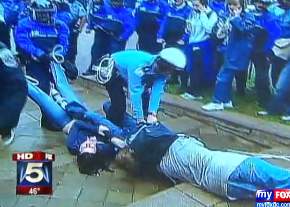
Lawyers You’ll Like Series: Mara Verheyden Hilliard Part II
Today we’re joined by attorney Mara Verheyden Hilliard co-founder of The Partnership for Civil Justice Legal Defense & Education Fund in the second part of our Lawyers You’ll Like series. Mara and her partner Carl Messineo have worked to defend and advance fundamental civil, constitutional and human rights secured by the U.S. Constitution and under law. We talk about her work, and criminalizing dissent, surveillance, data mining, and FBI harassment. A lot of Mara’s work is at the intersection of first and fourth amendment rights, such as the assault on free speech, assembly and misuse of datamining tools. The Partnership for Civil Justice has many victories, and recently a settlement was reached in a class action lawsuit about the illegality of the arrests of approximately 700 protesters and other persons on Saturday, April 15, 2000 in Washington, D.C.
Attorney Mara Verheyden-Hilliard:
- I co-founded the Partnership for Civil Justice in 1994 with Carl Messenio. We decided we wanted to do this work specifically, Constitutional rights, civic justice, public interest litigation.
- We began this work right after we left law school. We undertook some of the longest running protest cases that we had, in particular, the recently settled class action from the April 2000 mass arrests.
- I grew up in Washington DC and I spent my childhood going to civil rights demonstrations, anti-war demonstrations, having our house filled demonstrators. Both of my parents are deeply political people who care very much about civil rights, liberation struggles and womens’ rights.
- The core of the work we do we recognize as the underlying social justice movement.
- The municipalities, the governments, they want these cases to go on as long as possible, they want to fight a war of attrition, because they want plaintiffs to feel they have to take toothless settlements.
- The fact is the law has changed in DC, we’ve changed the way police operate. They can’t use these tactics, these tactics we took apart piece by piece have been removed from the arsenal of the police department in DC.
- The DC police can’t use the trap and detain tactic, they can’t hold people, they have to release them within 4 hours now. They can’t use the wrist to ankle handcuff mechanism against people anymore.
- Police need to have their badges plainly available and visible, they can’t come out in riot gear to first amendment assemblies. Now we’re seeing this effort (FBI) against solidarity activists with the raids and subpoenas. I think it is outrageous, and baseless for the government to be coming in and targeting people for solidarity work.
- It’s also reflective of the huge security apparatus that was put in place under Bush and is being accelerated under Obama. Those beliefs, that hope, that thought, that you can change the direction of the country that you live in, is absolutely true.
- All you gotta do is look at the past history of the United States, all 150 years.
- Recognize that it’s no fault to hope and to think that an elected official is going to do it, but historically the elected official has never been the one to do it.
Guest – Constitutional Rights Attorney Mara Verheyden Hilliard co-founder of The Partnership for Civil Justice Legal Defense & Education Fund. Mara Verheyden-Hilliard is an activist, Constitutional Rights attorney, and the cofounder of the Partnership for Civil Justice. She is also co-chair of the National Lawyers Guild Mass Defense Committee.
——


United States Plays Down UN Report on the Gaza Flotilla Attack
A United Nations fact finding mission into the May 31, 2010 Israeli lethal attacks of ships traveling to Gaza, has reported that Israeli forces violated international law, “including international humanitarian and human rights law.” Eight Turkish activists and one Turkish-American were killed in the raid on board the ships attempting to break the Gaza blockade. The UN Human Rights Council’s investigation judged Israel’s naval blockade of the Palestinian territory to be “unlawful” because there was a humanitarian crisis in Gaza at the time. However, the United States criticized what it termed as the report’s “unbalanced language, tone and conclusions.”
The Center for Constitutional Rights, the Free Gaza Movement and the National Lawyers Guild responded to the report and the comments made by the United States at the Council
“Unfortunately, the United States used the opportunity of the Human Right Council’s discussion on the flotilla fact-finding mission’s report to promote its political agenda instead of engaging on the issue of legal accountability for Israel’s illegal blockade of Gaza and the unlawful attack on the Gaza flotilla,” said CCR attorney Katherine Gallagher. “The U.S. must recognize that there can be no peace without justice, and that until it supports accountability for violations of international law–even when violations committed by Israel – instead of a culture of impunity, it lacks the legitimacy necessary to serve as a broker of peace.”
Attorney Katherine Gallagher:
- There were 6 civilian ships and their goal was to both bring humanitarian aid to Gaza which has been under a Naval blockade by Israel for the last 4 years as well as to challenge the legality.
- The United Nations back in June 2010 set up a fact finding mission. The 3 commissioners traveled to London, to Geneva, Istanbul and Jordan to interview passengers. They met with legal experts and others to analyze the evidence they heard.
- The UN fact finding report was submitted last week, 56 detailed pages of what precisely happened that night on those ships on the night of May 31. It was concluded that the blockade is illegal under international law. It found that the 6 ships traveling to Gaza to break the blockade presented no imminent threat to the Israelis.
- The 3 commissioners have experience in international law matters. One had been a judge on the international criminal court. Their conclusions are grounded in law and not political conclusions. They were peaceful protesters preparing for an attack on the ship.
- It’s hard to see what they find as unbalanced. I think the report is carefully written, it’s cautiously written beginning with an analysis of its own mandate. Turkey very much welcomed the report.
- The bulk of the passengers were detained in Israel, at detention sites that had already been established.
- Confiscated property consists of cameras, computer chips, video equipment. It contains electronic equipment that provides first hand evidence of the flotilla passengers activities and then the attack on the ship.
- In the past 4 months Israel has been in possession of that material.
Guest – Katherine Gallagher, Senior Staff Attorney at the Center for Constitutional Rights, where she focuses on holding individuals, including US and foreign government officials, and corporations, including private military contractors, accountable for serious human rights violations. Among the cases she is working on are Arar v. Ashcroft, Matar v. Dichter, Saleh v. Titan and Estate of Atban v. Blackwater.
———


Post Coup Honduran Human Rights Crisis
A human rights crisis continues to get worse in Honduras, more than a year after the June 28, 2009 military coup. People on the front lines that oppose the regime installed after the coup are beaten and illegally detained by the state. Nectali Rodezno, Co-Coordinator of National Front of Lawyers in Resistance Against the Coup in Honduras is among the lawyers dircectly involved in defending those are being abused and whose lives are on the line everyday. To inform people about the ongoing crisis in Honduras, there will be a speaking tour this fall called JUSTICE IN HONDURAS: Witness for Peace Mid-Atlantic Fall Speakers Tour will be November 1 – 22.
Attorney Pam Spees:
- From that moment on you began to see alot of repressive tactics immediately after the coup.
- Immediately, leaders of that resistance were being targeted. There were several key people who were killed in aftermath of the coup. Walter Trochez was a key LGBT activist who was targeted and killed in a very brutal way. You also saw the targeting of labor leaders. The killing continue even in this new de facto administration.
- In March you saw the targeting of journalists. In that month alone, 8 journalists were killed.
- The Honduran judiciary were taking certain steps before the coup to help undermine Zelaya and what he was doing. We’re still learning about how much of this was driven by official US policy.
- Before the coup we had the financial crisis in the US that was effecting food security which was making it difficult everywhere. Zelaya was trying to buffer the Hondurans against this. One of the things he did was raise the minimum wage. He raised it and tied it to the food index.
- The Bolivarian Alliance for the Peoples of Our America
- On June 28, the Honduran resistance has set up its own truth commission, The Alternative Truth Commission. The International Criminal Court is an actor and could investigate and potentially prosecute some of these acts.
- In the US we have the Alien Tort Statute. It’s a very old law that allows non-citizens to bring suit in US courts for violations of international law.
- The courage show by all sectors of this resistance is just incredible. www.resistenciahonduras.net
Guest – Pam Spees, senior staff attorney in the international human rights program at the Center for Constitutional Rights. She has a background in international criminal and human rights law with a gender focus, as well as criminal trial practice.
———————————————————————-
Criminalizing Dissent, Death Penalty, FBI Intrusion, Green Scare, Human Rights, Prison Industry, Supreme Court, Surveillance, Truth to Power
Podcast: Play in new window | Download
Updates:
———-
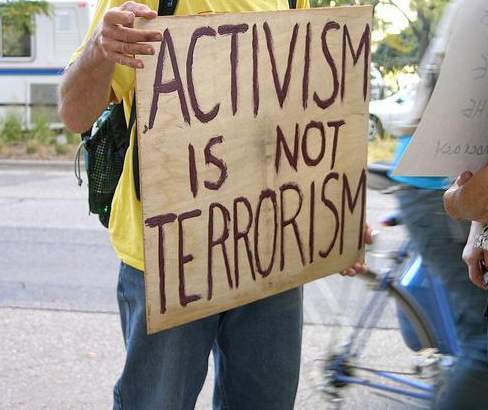

Nationally Coordinated FBI Raids Minnesota/Chicago
Last week the FBI raided six homes in Minneapolis and two in Chicago allegedly searching for links to terrorism. The Minneapolis raids targeted anti-war activists among them, Jessica Sundin, and Mick Kelly. They were key organizers of the big march on the first day of the RNC in 2008. In one Minneapolis home, FBI agents arrived with warrants, searched every room, attic and basement, looking through CDs DVDs, books, and photos. Passports, travel and phone records were among items seized from the homes. The FBI issued subpoenas for the peace activists to appear before a Grand Jury in Chicago on October 12. FBI’s search warrants indicate agents were looking for connections between local antiwar activists and groups in Colombia and the Middle East. NLG HOTLINE – 888-654-3265
Jim Fennerty:
- We’re putting a group of lawyers together from the National Lawyers Guild. We’re speaking to our clients right now about what a grand jury is, how it functions, and they have a right to refuse to testify at a grand jury or not. A total of 12 people were served with subpoenas.
- Humanitarian Law Project decision emboldens the government to push the envelope and see what they can get away with. I have not been told that anyone is a target, and we’re concerned about what that means.
- Technically the Attorney General’s office is not suppose to issue a subpoena to a target unless they get a higher authority to do that. Historically a grand jury was supposed to be citizens coming together to determine if charges should be filed criminally against somebody.
- Now it’s pretty much a rubber stamp for what the prosecutors want. People should be very concerned about going there, because what you say can be twisted around.
- Most cases, people can say they don’t want to testify at a grand jury, they’re going to exercise their fifth amendment rights against incrimination. However, if they offer you immunity and you refuse to testify, you can be taken to a judge, they’ll read the questions to the judge, and ask you to answer them.
- If you refuse to answer them then a judge can hold you in civil contempt and you can be incarcerated for the length of the remaining time of the grand jury. The government is not showing us all their cards, we don’t know where they’re going with this.
- Regarding activism: I’ve seen some unity here I’ve never seen before in my life, where groups that don’t get along, are now rallying around them.
- Do not speak to federal agent, do not lie to a federal agent. National Lawyers Guild Issues New Report on Policing of Protests
Guest – Attorney Jim Fennerty, attorney, activist and National Lawyers Guild member. Jim has been handling activist cases for 38 years.
——-


Death Penalty Cases -Virginia / Georgia / California
In late 2009, The American Law Institute which created the intellectual structure for the current capital justice system for nearly 50 years, essentially announced that its project has failed. The New York Times, in one article wrote the institute’s move represents a tectonic shift in legal theory. The article also points out that capital punishment was plagued by problems including racial disparities. We continue to see these types of problems in 3 recent death penalty cases in Virginia, Georgia and California. In Virginia, Teresa Lewis, a grandmother was the first woman to be executed in that state in nearly 100 years. Last week Teresa Lewis was given a lethal injection at 9PM in Greensville prison. Teresa was convicted of hiring two gunmen to shoot her husband and stepson to collect on their life insurance policy. Both gunmen were sentenced to life without parole. Attorneys argued that the court consider a key piece of evidence on Teresa’s behalf. That evidence was a letter from one of the gunmen who killed himself in jail in 2006, in which he claimed full responsibility for the murder plot and suggests he pushed Lewis into it. Lewis also had an IQ of 70.
Last week in a Georgia death penalty case, Brandon Joseph Rhode was found in his cell with his arms and neck slashed days before his scheduled execution by lethal injection. According to reports, his lawyers have pleaded clemency, arguing he suffered brain injury from alcoholism and because his mother took drugs during pregnancy. If executed, he will be the 25th person put to death by the state, the last one was in June. Rhode and an accomplice were sentenced to death for murdering an 11-year-old boy, his 15-year-old sister and their father during a botched robbery in 1998.
In California, a federal and state court judge refused death row inmate Albert Greenwood Brown’s request to block his scheduled execution. Brown and another death row inmate have filed a lawsuit challenging the state’s new lethal injection regulations,saying the procedures were improperly adopted. State procedures have since been revised after a federal judge halted the death penalty in California amid concern that it’s method lethal injection amounted to cruel and unusual punishment.
David Michaels:
- These are two horrible executions. Teresa Lewis had an IQ of 72. She was executed after Governor MacDonald refuse her clemency requests. The judge said she was the head of the serpent in this particular case and he decided horribly to have her executed.
- There’s no deterrent for people with the IQ of 72 or for someone with an IQ of 150. This murder happened in 1992, this execution happens in 2010.
- There are about 3 dozen states that have capital punishment laws. In California, one of the drugs they use for lethal injection has expired and they can’t get anymore.
- LINKS – NCADP / Death Penalty Information Service
Guest – Attorney David Seth Michaels. David has represented clients for 30 years, clients such as prison inmates in Mississippi and Tennessee. He’s worked with Brooklyn Legal Services B and with the Federal Defenders Service Appeals. He is also a novelist, has his own practice in New York. David Michaels’ Blog
—-


Circuit Court of Appeals Throws Out Nigerian Claims Against Shell Oil
It is now up to the Supreme Court to decide if corporations could be held liable in U.S. courts for violations of international human rights law. Recently, a U.S. Appeals Court dismissed a case against Royal Dutch Shell in which the oil company was accused of helping Nigerian authorities violently suppress protests against oil exploration in the 1990s. One judge on the three-member appeals court panel wrote a strong dissent of the majority opinion, calling it “a substantial blow to international law.” In a past interview with attorney Peter Weiss, Peter explained how a 1789 U.S. statute Alien Tort Claim was used to hold multinational corporations accountable for human rights crimes. The case was brought by families of seven Nigerians who were executed by a former military government for protesting Shell’s exploration and development.
Maria LaHood:
- This was a class action brought by the Ogoni people against Shell parent companies and Nigerian subsidiaries.
- They brought the case because Shell had been complicit with the military dictatorship in the nineties.
- They were detaining, torturing and killing people to oppress the grassroots opposition movement to Shell’s environmental degradation. Shell Oil is the US company.
- Basically, two judges went out of their way to find that corporations can’t be held liable for international human rights violations. The result is that corporations can profit from killing and torturing and can’t be required to compensate the victims.
- Hopefully this decision won’t stand. This is the first Circuit to rule like this.
- Unfortunately I think corporations are going to be submitting this decision in their own cases around the country. Hopefully, that won’t be successful. As it stands the decision applies to the Second Circuit, New York, Connecticut and Vermont.
- Even if this decision stands, the court left open and confirmed you can sue individuals. Even here we can sue CEOs and directors of corporations.
Guest – Attorney Maria LaHood has worked on the case Wiwa v. Royal Dutch/Shell, for the torture, detention and execution of Ken Saro-Wiwa and other human rights activists and protesters in Nigeria. Maria LaHood joined the Center for Constitutional Rights (CCR) in 2004. She specializes in international human rights litigation, seeking to hold government officials and corporations accountable for torture, extrajudicial killings, and war crimes abroad.
————————————————————————————————-
Afghanistan War, Civil Liberties, Criminalizing Dissent, FBI Intrusion, Green Scare, Habeas Corpus, Human Rights, Surveillance, Torture, Truth to Power
Podcast: Play in new window | Download

Blood and Oil in Central Asia
Is the Afghanistan War less over terrorism than it is over energy? It’s a high stakes chess board writes Conn Hallidan, a foreign policy analyst, and if the US controls the sources of energy of its rivals, Europe, Japan and China, and other nations, they win. Hallinan, says strategic energy alliances are forming between Russia and China. China is planning a 4 thousand mile pipeline from the Caspian Basin to the Guangdong Province while Russia is locking up natural resources such as natural gas in Kazakhstan and Uzbekistan.
Conn Hallinan:
- It’s about the United States attempting to control energy sources at a time when world oil reserves are beginning to drop.
- In fact there’s going to be a sharp drop in world oil reserves while Brazil India and China are growing fast. There’s a growing sharp competition for controlling those energy resources.
- The United States pretty much has its thumb on the Middle East oil reserves and has been maneuvering to control natural gas and oil coming out of Caspian Basin.
- Follow the roadways for Pipelanistan, looking at energy resources as looking at a map.
- This is a battle for control of energy resources. Whoever holds the high ground in the next half century will have their hand on jugular vein of their competitors.
- Tremendous expansion of NATO into former Soviet areas and into Central Asia creates the counter-response. Shanghai Cooperation Organizations
- The SCO is on a roll. China loaned Turkmenistan 3 billion dollars.
- Long term goals for current administration not very different from past administration.
- I want to go the White House and sit down with Obama and say, “ok, look just read Kipling, read Kim, the poem, Arithmetic on the Frontier.”
- The situation is a complete disaster, we’re destabilizing India and Pakistan, the most single dangerous flash-point in the world right now.
Guest – Conn Hallinan , a columnist for Foreign Policy In Focus and a lecturer in journalism at the University of California, Santa Cruz.
————-
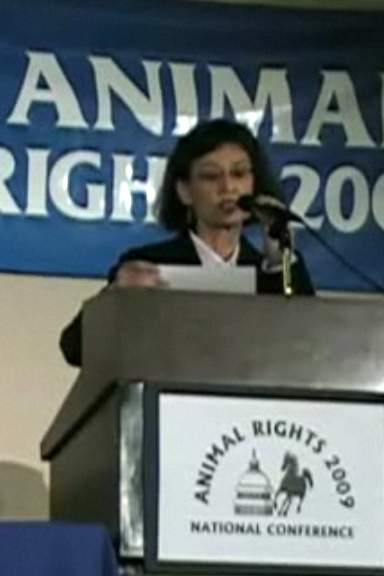
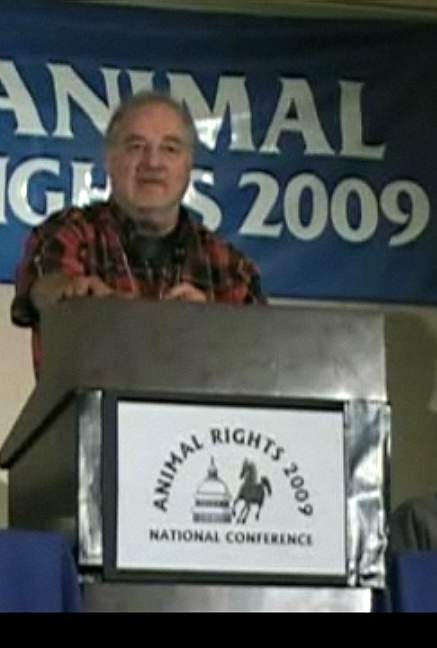
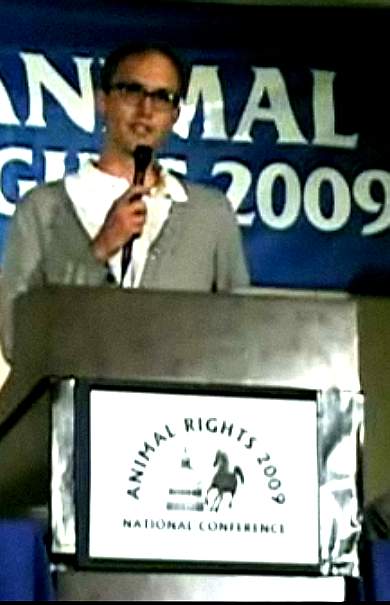
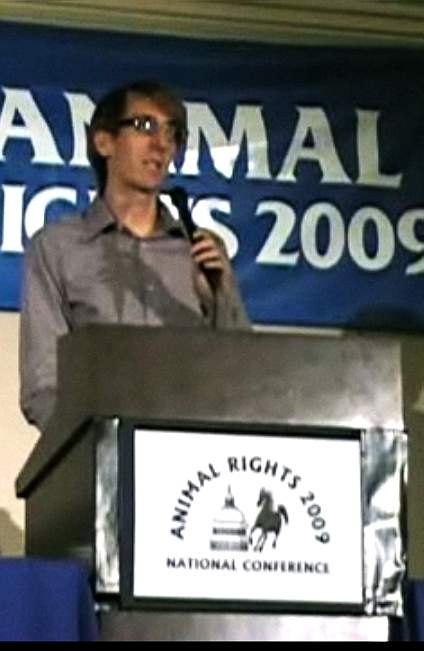
Animal Rights Annual Conference 2009 Speeches
We hear four speeches from the Animal Rights Annual Conference this year. The speakers are our own co-host Heidi Boghosian, Attorney Matthew Strugar, Social Justice Attorney Bob Bloom, and Will Potter. Full list of speakers.
Heidi Boghosian:
Bob Bloom:
- One of the defense attorneys for the Animal Terrorism Enterprise Act 4.
- What I learned defending the Black Panther Party, in the criminal justice system, is that there is a particular mechanism to control people who want to make things better, who want to change things. Courts are not for justice, they’re for repression.
- Under the animal enterprise act, you can have a business enterprise that uses and tortures animals. It just doesn’t seem right.
- Ask the experimenters why they experiment on animals and the answer is quote – because the animals are like us.
- Ask the experimenters why its morally ok to experiment on animals and the answer is quote because the animals are not like us.
Will Potter:
- GreenIsTheNewRed
- Communication enhancement facilities are political prisons for those who have been widely connected with others. When you have secretive facilities and special legislation or so-called second tier terrorism inmates, you’ll soon have secretive facilities and special legislation or so-called third tier terrorism inmates and secretive facilities and fourth tier terrorism inmates, until brick by brick, the barriers of what is being labeled a protester and an activist and a dissident and a terrorist have completely crumbled.
Matt Streuger:
——
The Animal Enterprise Terrorism Act (AETA) is a United States federal law It was signed by the President of the United States November 27, 2006. Earlier versions of the bill were known as S. 1926 and H.R. 4239. The bill is described by the author as being intended to “provide the Department of Justice the necessary authority to apprehend, prosecute, and convict individuals committing animal enterprise terror.”
Analysis of The Animal Enterprise Terrorism Act
—————————————————————————
Civil Liberties, Criminalizing Dissent, Green Scare, Guantanamo, Human Rights, RFID, Surveillance, Targeting Muslims, Torture, Truth to Power
Podcast: Play in new window | Download
Updates:


Green Scare: The Case of Briana Waters Update
Briana Waters, 32 was sentenced to six years in federal prison and ordered to pay $6 million in restitution by U.S. District Court Judge Franklin Burgess, who also declined her lawyer’s request that Waters be released on her own recognizance pending appeal. Here on Law and Disorder we’ve discussed how (since December 2005) environmental activists in the United States have been targeted and handed unusually harsh prison sentences. It’s been called Green Scare.
Briana was accused of acting as a lookout in the conspiracy to set fire to the University of Washington’s Center for Urban Horticulture in 2001. This, despite evidence presented by the defense that she was 60 miles away at the time of the arson. Others claimed responsibility for the fire. How the Government Targets Eco-Activists. Listen to NLG event.
Federal “conspiracy law†is often used by prosecutors to take down drug dealers, the same legal approach is used to charge environmental protesters. Once the judge accepts the charge of conspiracy, here-say is admissible making conspiracy and very easy to prove in court.
Last year the NLG established a hotline 1-888-NLG-ECOL for activists who had been targeted by the FBI for environmental activism.
Guest: Ben Rosenfeld, California Civil Rights attorney
–
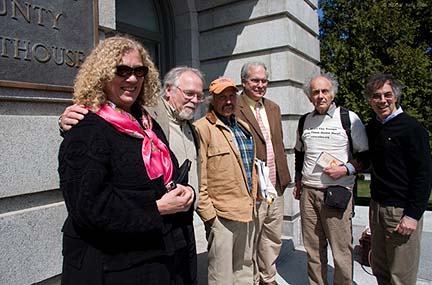
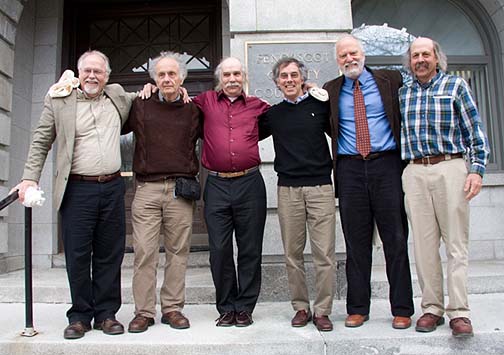
Taking Back The Right To Dissent: The Case of the Bangor Six
Recently, jurors in the Case of the ‘Bangor Six’ brought back a decisive verdict of ‘not guilty.’ The six veterans for peace, anti war protesters were arrested in March of last year after refusing to leave the federal building where their senator, Republican Susan Collins has her office. The six activists were among 12 that say they were protesting Bush’s proposal to increase troops in Iraq to support a military strategy known s the surge and also urged Collins to vote against continued funding for the war. Collins did not vote against funding for the war and did not meet with activists. Six of the activists were later arrested. (Collins Watch)
During this trial, the jury was allowed by the judge to decide whether the defendants believed that they were not guilty in making a conscious choice to break Maine law because they thought international law was being violated. The jurors decided unanimously that the protesters did believe they had the ‘license and privilege’ to act as they did, in rendering the ‘not guilty’ verdict.
Guest – Bar Harbor attorney Lynne Williams, also with Maine Lawyers for Democracy a group of 65 Maine lawyers, calling for the impeachment of President Bush and Vice President Cheney.
—
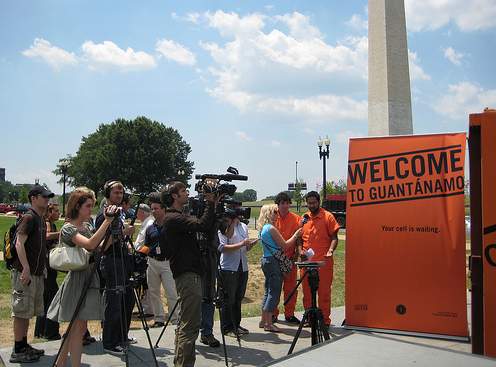
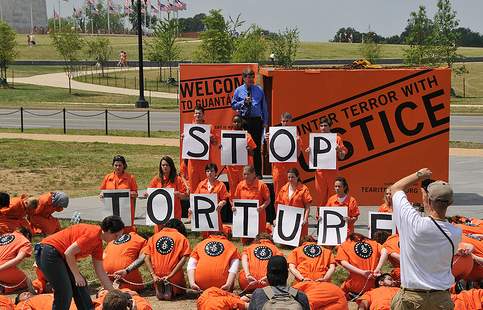

Amnesty International USA: Guantanamo Cell Replica
This past week, Amnesty International USA hauled a life size Guantanamo cell replica to the National mall in Washington DC. Activists and tourists gathered to experience the bleakness of being held in such confinement without hope. The cell replica visited the nation’s capital as a U.S. House Judiciary Subcommittee heard testimony on harsh interrogation techniques from Vice President Dick Cheney’s chief of staff David Addington and former U.S. Justice Department lawyer John Yoo.
We listen to voices of tourists, activists and James Yee, former US Army chaplain, who ministered to Muslim detainees held at Guantánamo Bay Naval base. Yee as listeners may know, was the subject to an intense investigation by the United States. A special thank you to Karen Miller for gathering the audio for this segment.
———————-
Civil Liberties, Criminalizing Dissent, Extraordinary Rendition, Green Scare, Guantanamo, Habeas Corpus, Human Rights, Iraq War, Military Tribunal, Surveillance, Targeting Muslims, Torture, Truth to Power
Podcast: Play in new window | Download

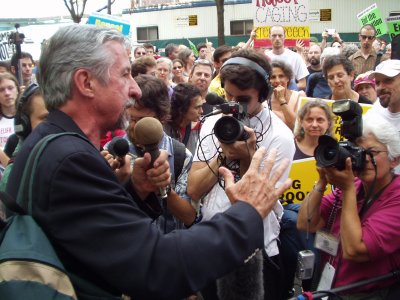
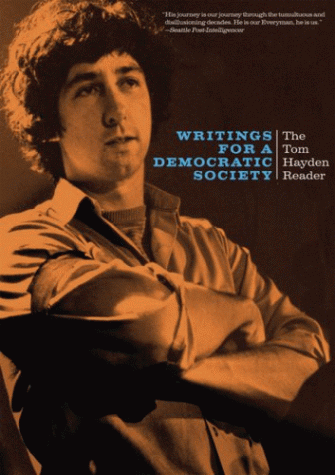
Ending The War In Iraq: Tom Hayden
Long time political and social activist Tom Hayden joins Law and Disorder hosts for a lively interview and discussion on specific ways to end the illegal war in Iraq. Tom Hayden is a former California state senator, a passionate anti-war activist and has published an anthology titled “Writings For A Democratic Society” , in it he chronicles key civil rights movements and potent sixties activism. The book is a collection of essays, pamphlets, op-ed pieces from the Port Huron Statement – a manifesto for sixties radicals, to reports on the riots at Chicago’s 1968 Democratic National Convention.
Guest – Tom Hayden, political and social activist, author of Ending The War In Iraq. Tom Hayden’s Blog
—


Green Scare: The Case of Briana Waters
Here on Law and Disorder we’ve discussed how since December 2005, environmental activists in the United States have been targeted and handed unusually harsh prison sentences. It’s called Green Scare and more than a year ago the National Lawyer’s Guild sponsored an event titled Green Scare – How the Government Is Targeting Eco-Activists. Listen to it here.
Last year the NLG established a hotline 1-888-NLG-ECOL for activists who had been targeted by the FBI for environmental activism.
We bring this up in context of the case involving Briana Waters. Acting as a lookout, she was accused of conspiring to set fire to the University of Washington’s Center for Urban Horticulture in 2001. This, despite evidence presented by the defense that she was 60 miles away at the time of the arson. Others claimed responsibility for the fire, but Ms. Waters, a 32 year old mother and violin teacher may face a mandatory minimum of 35 years in prison.
Federal “conspiracy law†is used often to prosecute drug dealers and is being used by prosecutors to take down individual environmental protesters. Once the judge accepts the charge of conspiracy, here-say is admissible making conspiracy very easy to prove in court.
Guest: California civil rights attorney Ben Rosenfeld
—
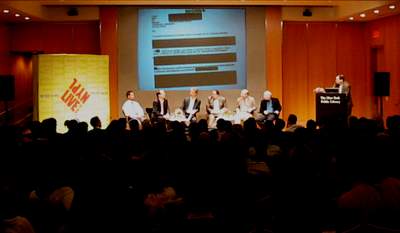

An Innocent Man In Guantanamo: Five Years of My Life, Part III
Today we hear excerpts from the third part of the event An Innocent Man In Guantanamo: Five Years of My Life. That’s the title of the memoirs recently released by Murat Kurnaz who was detained at Guantanamo for five years. Kurnaz is a Turkish citizen and legal resident of Germany, he traveled to Pakistan to learn more about his Muslim faith and was later arrested at a checkpoint, handed to the United States and eventually taken to Guantanamo Bay, Cuba. Former US Army Muslim Chaplain of Guantanamo Bay, James Yee voices his concern about other secret prisons in Afghanistan and systematic abuse to prisoners involving IRF teams.
The event presented by Friends of the Library, brought together a panel of lawyers from the U.S. and Germany who fought for Murat’s release and a Guantanamo chaplain who was accused of espionage and imprisoned. The panel was moderated by our own Michael Ratner. Speakers include:
- Baher Azmy – Professor at Seton Hall Law School, where he directs a civil rights clinic and teaches constitutional law. His litigation work on national security and human rights cases emerging from the “war on terror†include lawfulness of extraordinary rendition, torture and indefinite executive detention. In July 2004, Azmy began representation of Murat Kurnaz imprisoned in Guantanamo Bay until his release in August 2006.
- Bernhard Docke – a lawyer since 1983, specializes in criminal law, since 1989 partner of the law firm “Dr. Heinrich Hannover und Partner†in Bremen, Germany. He has been a lawyer for Mr. Kurnaz since 2002.
- Wallace Shawn – an Obie-winning playwright and a stage and screen actor. His plays include The Designated Mourner, Marie and Bruce, The Fever, and Aunt Dan and Lemon. He co-wrote and starred in the art-house classic My Dinner with Andre and he also performed in numerous Woody Allen films including Manhattan and Radio Days. Our Late Night and a Thought in Three Parts: Two Plays will be published in Spring 2008.
- James Yee – the former US Army Muslim Chaplain of Guantanamo Bay. His book, For God And Country, Faith and Patriotism Under Fire, tells the story about being wrongly accused of espionage and imprisoned by the U.S. military. In 2004, the government dropped all charges against him and he received an honorable discharge from the U.S. Army.
- Phillipe Sands – an international lawyer and a professor of law at University College London. He is the author of Lawless World and is frequently a commentator on news and current affairs programs including CNN, MSNBC and BBC World Service. Sands has been involved in many international cases, including the World Court trial of Slobodan Milosevic and the treatment of British detainees at Guantanamo Bay. His article in Vanity Fair “The Green Light,†looks at how high level members of the Bush administration pressured underlings to use torture tactics at Guantanamo. He is also the author of Torture Team: Rumsfeld’s Memo and the Betrayal of American Values.














